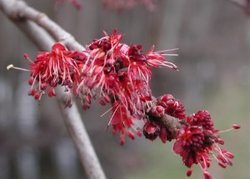Maple
|
|
| Maple | ||||||||||||
|---|---|---|---|---|---|---|---|---|---|---|---|---|
 Red Maple flowers | ||||||||||||
| Scientific classification | ||||||||||||
|
Maples are trees of the genus Acer in the Order Sapindales, variously classified in a family of their own Aceraceae, or (together with the Hippocastanaceae) in Sapindaceae; genetic evidence points to the latter being the more accurate option. They are distinguished by opposite leaf arrangement, with usually palmately lobed, or occasionally pinnate or unlobed leaves. The flowers are regular, pentamerous, and borne in racemes, corymbs, or umbels. Their distinctive fruit, called a key, is a type of samara, shaped to spin as it falls and carry the seeds a considerable distance on the wind. The name 'acer' derives from the Latin "acris" (sharp), from the hardness of the wood, used for lances in the past.
Orangemaple.jpg
The leaves in most species are palmately veined and lobed, with 3-9 veins each leading to a lobe, one of which is in the middle. Several species, including the Paperbark Maple Acer griseum, Manchurian Maple Acer mandshuricum, Nikko Maple Acer maximowicziana, and Three-flower Maple Acer triflorum, have trifoliate leaves. The Manitoba Maple (Acer negundo) has pinnately compound leaves that may be simply trifoliate or may have 5, 7, or rarely 9 leaflets. One maple, the Hornbeam Maple Acer carpinifolium, has pinnately-veined simple leaves that resemble those of hornbeams.
Maples flower in late winter or early spring, in some species before the leaves appear, but with or just after the leaves in most. Their flowers are small and inconspicuous, though the effect of an entire avenue of maples in flower can be striking. They have five sepals, five petals about 1-6 mm long, twelve stamens about 6-10 mm long in two rings of six, and two pistils or a pistil with two styles. The ovary is superior and has two carpels, whose wings elongate the flowers, making it easy to tell which flowers are female. Within a few weeks to six months of flowering, the trees drop large numbers of seeds.
Maples are important for timber production, syrup sources, and as cultivated ornamental plants. Sugar Maple is the wood of choice for bowling pins and bowling alley lanes. Some species have bright autumnal leaf coloring. The Sugar Maple (Acer saccharum) is tapped for sap, which is then boiled to produce maple syrup or made into maple sugar or maple candy. Quebec is the world's largest producer of maple sugar products.
Maples are an important early spring source of pollen and nectar for bees, especially honeybees, which use its resources for spring buildup. Maples are used as a food plant for the larvae of some Lepidoptera species including Pale November Moth.
The flag of Canada depicts a stylized maple leaf and is a prominent national symbol.
